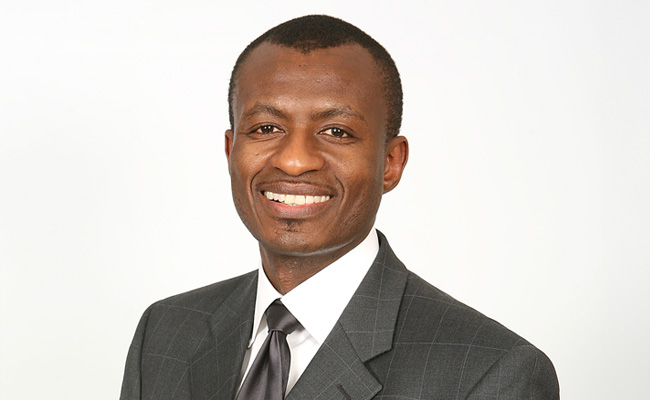It seems inevitable that Hlelo Giyose made asset management his career; his first exposure to the stock market was at the fresh age of 13. And all thanks to his mum.
The 54-year-old, whose Yankee twang belies his South African roots, was born in Botswana to South African political exiles; his father had escaped house arrest in 1964 and skipped the country, crossing from Botswana to Zambia to Uganda before settling with his young family in the US.
“That’s not important,” Giyose tells Currency; what was important was that Mrs Giyose, a chartered accountant “loved” the stock market.
“She made me a few offers I couldn’t refuse – like the mafia do,” he says.
The first was to open a bank account with her son, aged eight. The deal was that whatever Giyose had in his account at the end of the year, she’d double. “So I became a busy bee, saving everything I got. And then I got busy doing weekend jobs just to get as much money as possible. When I got to the age of 13 she said: ‘This is too much, I can’t afford it.’ And I said: ‘Then how am I going to make money?’”
Her answer: buy shares.
The first stock Giyose bought was Chubb International, the security company. Having asked his mother what shares to pick, he says Mrs Giyose’s advice was to buy companies that he knew. AT&T was another – helping him ride the early boom for telecoms businesses. And so it went. By the time Giyose started university in New Hampshire, he’d done so well that his father asked to borrow some money.
“Well: he didn’t borrow, he took. And we had a fight and I said: ‘Bring that money back,’ and he said he couldn’t because he’d bought things for the home, and my mum just said: that’s a lesson – never lend money to family and friends.”
Call it two formative pillars, if you like.
Matching time with temperament
As for his most deeply held investment beliefs, honed over a 40-year period, Giyose says that human beings in general “are naturally horrible” at matching time with temperament “and what it takes to produce good outcomes”.
“What you need to do to succeed will take longer than you think because it will happen slower than you think.”
It’s one of the tenets that has been both a blessing and a curse for the founder of First Avenue Investment Management since it opened its doors 15 years ago, in 2010.
And while it’s a maxim that’s probably as true for life in general as it is for the stock market, for Giyose it has helped mould an investment philosophy of patiently holding a central anchor of shares in a portfolio where a minimum investment period is something like 20 years – at least. “You operate around the anchor but you don’t remove the anchor otherwise the ship goes adrift,” is his belief.
Another is that short-term bias inevitably leads to blinkered investment calls.
“You’d make more money out of Clicks if you held it over a 20-year period than over five years. And indeed, Clicks is probably the second best performing company on the JSE over the past 20 years after Capitec,” he tells Currency.
Another of his favourite lowly-rated local stocks is Advtech. “Most people would say: ‘I wouldn’t have thought that.’ So what does that tell you as an investor? Time arbitrage is an extremely powerful factor to base your investment philosophy on.”
Does that mean that you should almost always just buy a share, and then forget about it? Not exactly. The key is to pick those businesses that will be around for a long time where gains aren’t erratic and overly subject to external forces. It ties into another bit of advice that Giyose received as a teenager – this time from his father.
“He said: ‘Son, pay attention because things change very slowly.’ It’s almost an oxymoron, because what do people usually pay attention to? Things that change quickly. I thought he was talking nonsense,” says Giyose now.
But Clicks, he argues, is a fantastic local example of where external changes – like, say, the facade of its stores – are almost imperceptible to its customers given its history and ubiquity even as the rate of change inside the company was “enormous”.
Channelling Buffett
Giyose clearly buys into the investment style known as Growth at a Reasonable Price, or GARP, espoused by Philip Fisher – who, for example, owned shares in Motorola from the 1940s until he died in 2000.
“Provided a stock market has optimal diversity (like the US market) you can find enough companies in it that you can purchase, keep track of, keep educating yourself about and continue to be happy about their performance for at least 50 years,” Giyose says, citing – who else? – Warren Buffett.
The Berkshire Hathaway chair, whose physical longevity is almost as impressive as his returns has held shares like American Express for 53 years, Coca-Cola for 60, and See’s Candies – which remains one of his best performing companies – for 63 years.
Finding such companies on the JSE, however, is increasingly a challenge given how the number of listed companies has shrunk since First Avenue started out. Then there was the offshore stampede caused by the changes to regulation 28 in 2022, which allowed retirement funds to invest as much as 45% of their assets offshore.
It’s one of the reasons that Giyose has gone fairly media quiet in the past few years. First Avenue had to recalibrate its business, and has subsequently teamed up with Cape-based wealth manager Northstar to better compete for client funds.
“We weren’t going to get called to talk about Truworths or Mr Price, we were going to be called to talk about how to navigate through a $15-trillion global market,” says Giyose. “So I had to reconfigure myself to rise with that challenge. Now, with this configuration, we can.”
While regulation 28 has almost certainly been part of the JSE’s great shrink, Giyose reckons it’s been much better for customers, ultimately.
“I am a big believer in market-based competition; in opening up any market to as much competition as possible. You can only get better because of it,” he says, arguing that the JSE for too long had enjoyed a sort of “hothouse” effect where, thanks to exchange controls, too much money was chasing too few stocks.
The other factor in going silent was probably the pain that First Avenue took by not being invested in commodity stocks between 2016 and 2020. Every investor has a horror call at some stage; this was Giyose’s.
“In 2016 to 2020 we were underweight resources exactly because of this deeply held belief that we prefer companies that change slowly and we do not want to over-expose the portfolio to companies that change quickly. Now remember what happened? Quantitative easing.”
It gave a colossal shot in the arm to commodity prices but “we got killed”, he admits.
Asked why he didn’t change tack, Giyose says the cause of the “dislocation” between share prices and valuations was entirely exogenous – and no-one knew when the Federal Reserve would stop its money-printing presses.
“If you were to say to me: there’s demand in China, you could maybe estimate when demand might end. But if some central banker is sitting there, only he knows when he’s going to stop it. Then your guess is as good as mine, so if we’d changed course, it would have just been a thumb-suck.”
It’s that damned element of luck, once again, and, says Giyose ruefully: “I’m splitting hairs here – if you’re winning because of luck, you’re winning. If you’re winning because of greatness, you’re winning.”
But, then the Fed stopped quantitative easing, interest rates shot up “and everyone could see the Kool-Aid had had too much sugar”. First Avenue’s performance picked up and clients came back. Still, a painful experience.
Asked what he’s got right, it’s the flipside of the commodity rout the company suffered.
“When I tell you about the companies that have been anchors in our portfolio, they’re companies we’ve held since 2010 when we started First Avenue and look at how well they’ve done,” he says. It means customers “know exactly what we stand for: high conviction and anchor-type quality companies. And I tell you, that’s golden.”
Ordered thoughts
Another of Giyose’s firmly held beliefs is that the function of investing “is to order your thoughts with other people”.
Order implies chaos or disorder, he says, “but that’s how the world is. Look at Donald Trump – chaos. But you become circumspect about intervening when there’s so much chaos because how do you know that you are not exacerbating chaos? So you order your thoughts with your colleagues, you look out for your own biases, you listen. That’s why it’s a difficult job.”
It’s refreshing to hear that from someone who’s had as much personal and professional experience in the market as Giyose. Unsurprisingly, he loves Trump’s proposal that each child born in America should have an investment account established with an initial $1,000 deposit.
“America incentivises you to pull yourself up by your bootstraps or perish; that economy makes no excuses for you. But the problem is that we don’t all start from the same starting line. For a conservative Republican that’s incredibly compassionate. But it’s also pragmatic.”
Imagine if South Africa did the same.
This article was produced in partnership with Stanlib.
Sign up to Currency’s weekly newsletters to receive your own bulletin of weekday news and weekend treats. Register here.










